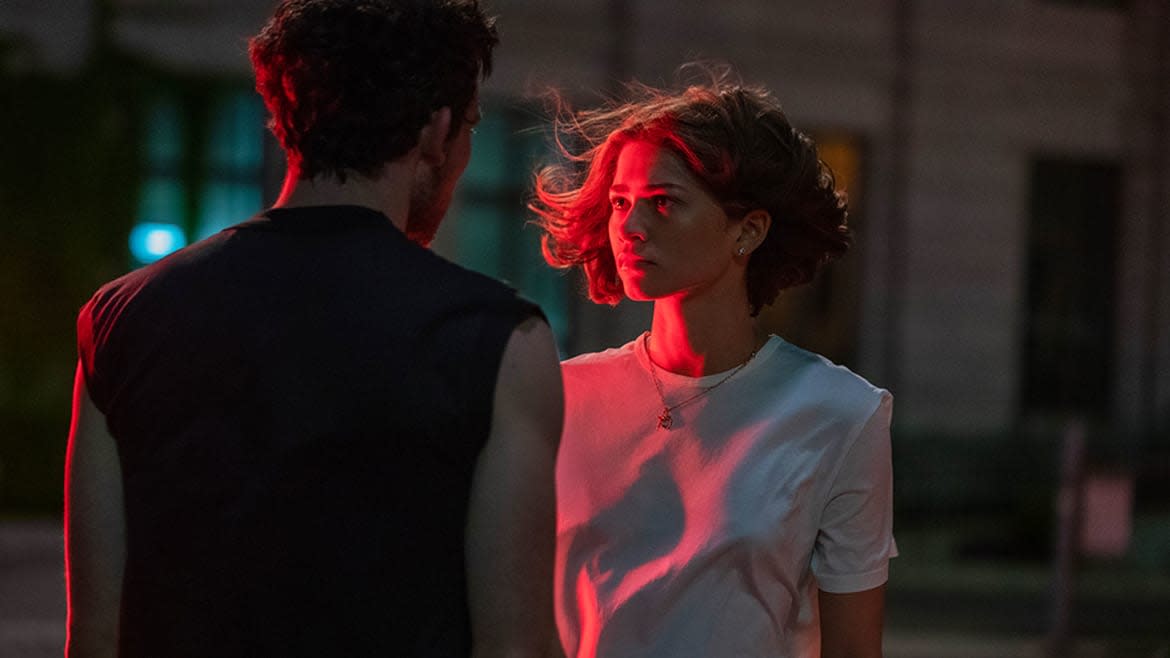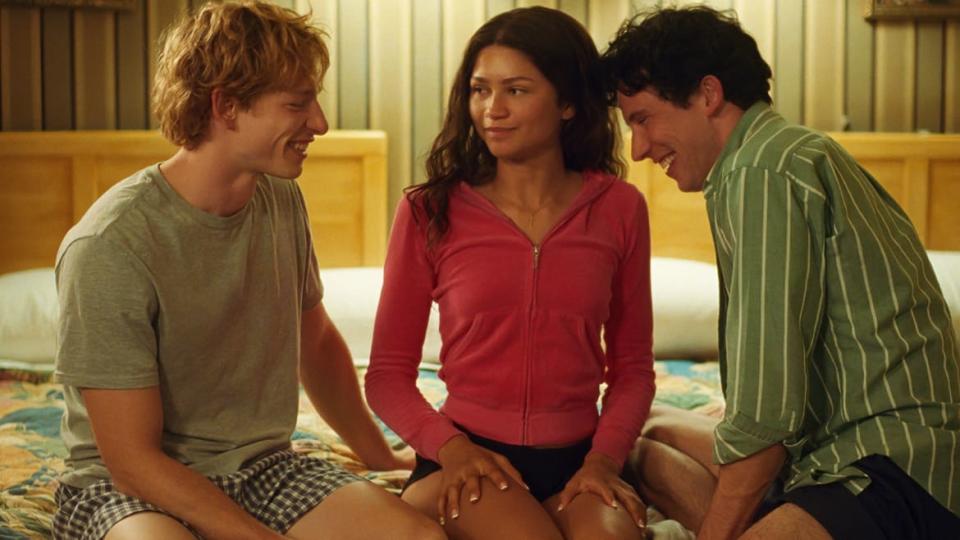‘Challengers’ Is a Grand Slam of Sex and Sweat

- Oops!Something went wrong.Please try again later.
The orgasmic groaning and grunting are part of tennis’ appeal. They reflect the intensity of the sport: how hard players have to hit the ball; how fast they have to dash from one end of the court to the other; how carefully they have to avoid slipping on their own sweat, dripping off their body and onto the ground in the punishing heat of the sun. Just making contact between the ball and racket is enough primal satisfaction to rival any roll in the hay. A loud, irrepressible moan serves the same purpose in tennis as it does in sex. The noise is both a gasp of pleasure and a way to catch your breath to ensure the experience lasts as long as it can.
There is plenty of this rapture in Challengers, both on and off the court. Luca Guadagnino’s latest film, in theaters Apr. 26, is a fluid, psychosexual heater paced as fast and as thrilling as any tennis tournament. Drama is spiked across the net and volleyed back and forth between the movie’s three players in a fiery match with everything at stake. In the film, tennis is very much a three-person sport, and every new serve feels like it’s for the match point. Advantage oscillates between a different person with each scene. Heat swells, tensions flare, and skin is slick with perspiration, but fatigue never once sets in—for the characters or the audience.
Energy is what tennis demands, and Challengers has it in droves. Justin Kuritzkes’ screenplay is a dynamic exploration of passion that puts its central trio of young tennis prodigies under Guadagnino’s finely focused microscope. Co-stars Zendaya, Josh O’Connor, and Mike Faist flit about, finding new ways to push and pull each other across 13 years of contorted friendship and estranged relationships, hurtling toward one big reunion that will dictate their shared pasts and uncertain futures. It’s a boisterous ride, and though it’s never quite as nasty and deceitful as it initially purports, the film gets its kicks from the rush of the larger game, not just from its players’ moves. The precise calculation is exhilarating, and Challengers is an exemplary model of just how much breathless action three people can conjure with the love of their game on the line.
‘Mary & George’: Julianne Moore Loans Her Son Out for Sex in Lusty New Series
When we first meet Tashi Duncan (Zendaya), she’s taken her eyes off the game. It’s unlike the former tennis whiz not to follow the ball, but she’s got much more on her mind than just a small challenger match in New Rochelle, New York. While everyone else’s heads turn to and fro, following the fuzzy green sphere zipping past them, Tashi follows a separate momentum, that of her own match; hers is a game within a game, one that has much more in danger than just a paltry amount of prize money. The rest of the audience sees star pro Art Donaldson (Mike Faist) take on his old pal—now his cocky, distanced enemy—Patrick Zweig (Josh O’Connor), but Tashi is watching her husband and ex-boyfriend do battle. Art is the man she could mold, while Patrick is the man she could never tame. Patrick, Art, and Tashi all have their reasons to be on edge, but how they overlap remains, at first, a mystery.
The 2019 New Rochelle match is the culmination of the trio’s knotty 13-year dynamic, which began back in 2006 at the Junior US Open amidst a blur of cigarettes, cheap gas station beer, and late-teens pheromones. Tashi, then the country’s youngest star—primed to go pro anytime she wanted, with an Adidas campaign to boot—made then-best-friends Art and Patrick a promise that neither of them could refuse, sealing it with a three-way kiss. Tashi could maneuver those in her orbit just as willfully as she could a ball across the court, and the pledge of her devotion proved an alluring enough prize to put an irreparable crack in the bond of Patrick and Art’s brotherhood.

Zendaya
The title of Challengers is a delectable double entendre, referring to the challenger matches where competing tennis players enter to practice their sport and win a bit of prize money, as well as the unspoken rivalry that fuels Tashi, Patrick, and Art. Even after a traumatic injury takes a young Tashi out of the sport, driving her away from Patrick and into Art’s arms, none of them can forget how their connections were forged. That complex inception drives each one toward a different prize. For Art, the goal is early retirement and time to enjoy his wife. For Patrick, it’s the chance to prove himself to his friend and old flame. For Tashi, it’s a way to remind her husband—and herself—what fueled this gnarled interconnection in the first place. “We’re always talking about tennis,” Tashi tells Patrick with a smirk, half-naked in her college dorm after he asks whether her foreplay is referencing his performance on the court.
In Challengers, tennis is sex, and sex is tennis. The two things are never separate, and their concurrence is what makes the film such a fascinating, lithe creature. Guadagino’s movie is wholly unpredictable; even if its audience has an idea of where it might be headed, the director’s vision only gets more playful and intriguingly erratic as it draws to its big finish. The New Rochelle challenger match boasts some of the strongest and most spellbinding filmmaking of any film this year, with a host of ambitious choices, unlike anything Guadagnino has achieved in his career thus far. Watching the game is electrifying as it is, until the perspective switches to point-of-view shots that hop between Art and Patrick, and then to the ball as it soars over the net at each player. The kinetic direction mounts to a mind-blowing high in these scenes, but remains present throughout the movie, holding that unflagging pace for the entirety of the film.
Such euphoric filmmaking is enhanced by Trent Reznor and Atticus Ross’ intoxicating, synth-heavy score, which asserts itself as an indispensable part of the film. In Challengers, the music acts as punctuation, both periods and ellipses. Parts of it will kick in mid-sentence, as if someone accidentally opened Spotify while talking. Other times, the score will begin over a protracted conversation, amplifying the pressure during a heated tête-à-tête. It’s atypical for such a high-energy score to find its place in these otherwise quiet moments, but the music is a way for Guadagnino to augment this idea that everything—each word of dialogue and choice made by a character—is about tennis, and shares all of the same stakes. Everything is, therefore, also about sex, which is precisely what listening to Reznor and Ross’ agile set of electronic hedonism feels like.
Prince Andrew Is a Chillingly Good Villain in Epstein Interview Drama
Each member of Challengers’ core threesome is down to get dirty. Zendaya, in her first proper leading role in a film, is the best she’s ever been, free from insipid Marvel scripts, Dune’s nonsensicality, and Euphoria’s melodramatic histrionics. Here, she can operate with more subtlety, and it’s a joy to watch what she can do with all of Tashi’s power. It is, however, Mike Faist and particularly Josh O’Connor—whose charisma and sex appeal will leave knees weak on the way out of the theater—who command most of the film. While Challengers is very much about sex and desire, it’s just as much about the intensity that two men can have with one another.
The viewer plays the role of voyeur while O’Connor and Faist talk closely, look into each other’s eyes, and tease one another through the years. Even when the two boys kiss on the night they meet Tashi, their exchange isn’t necessarily about romance, but about unlocking deeper passion, and in turn, more risk. Art and Patrick are locked in a proverbial dick-measuring contest that is only semi-friendly, and watching the results might be the most erotic any film has been this year. Thighs are grabbed, eyebrows are raised, legs are spread, and a pool of sweat drips over every frame—and that’s not even including the New Rochelle match, which should be lauded as a new achievement in capturing the prurient highs of athletic machismo.
As the film slides toward that ending, Guadagnino’s direction gets more off-kilter, and the idea that there is any line between sex and tennis dissipates for good. Challengers is asking its audience to ogle the men, to be entranced by the enigma of whatever it is they’re really playing for. The stakes and the strangeness of this situation are reflected in the bones of the film. Guadagnino’s brisk direction is the bulging vein that runs under the movie’s sinewy musculature, keeping its blood pumping. There’s a carefully constructed symbiosis between direction, script, and score that gracefully twists into something that feels taut and practical, like the cinematic equivalent of a tennis braid.
Challengers is a bonafide buffet of sexy, sweaty danger. Early in the film, Tashi tells Patrick and Art that “tennis is a relationship.” This terrible trio spends the rest of the movie trying to work out just what kind of connection that is, and what it means for all three of them. Is a relationship about passion, or is it about ease and convenience? Whether or not there’s a middle ground is up in the air, volleyed over the net. And if there is some happy medium, how do you navigate exactly what you want without getting yourself into trouble? It’s impossible to know without risking it all, and there are few things more riveting than watching three monstrous egos hazard their legacies for a shot at enlightenment on the hot clay of a tennis court.
Get the Daily Beast's biggest scoops and scandals delivered right to your inbox. Sign up now.
Stay informed and gain unlimited access to the Daily Beast's unmatched reporting. Subscribe now.

